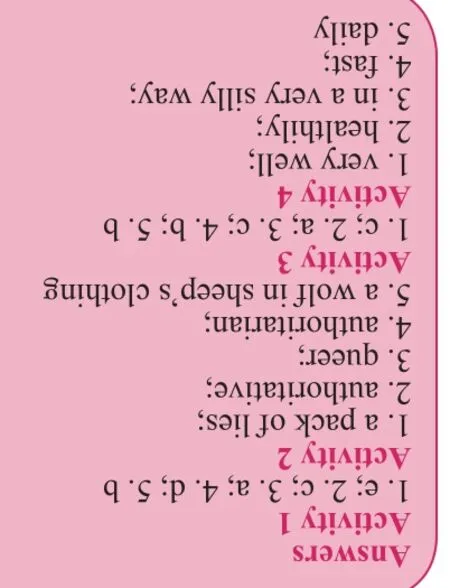英伦学堂
2017-11-17
英伦学堂

Exchanging letters: a type of joke in which the fi rst letters of similar sounding words in the answer are exchanged.
Exchanging Letters
ByMarsha Henderson
A good old British joke
As you know, the British love wordplay, and there are many jokes beginning with the question, ‘What’s the difference?’ between two completely different things. The answers sound almost the same, but we exchange the fi rst letters.
What’s the difference between bad weather and an injured lion?
One of them pours with rain and the other roars with pain.
What do you think the answer to this one is?
What’s the difference between a tired teacher and an angry dog?
One of them marks badly and the other ….(see answer below)
When someone famously makes mistakes …
A spoonerism, in which the speaker exchanges the first letters of two words, is very similar. Sometimes, they’re funny mistakes and sometimes made on purpose. You might say that everything an untruthful person says is just a lack of pies—a pack of lies.
Spoonerisms got their name from William Archibald Spooner (1844-1930), of Oxford University, who made these mistakes a lot. One of his most famous is ‘Three cheers for our queer old dean!’ He was talking about Queen Victoria, not a respected member of the university staff!
A famous British character
Another type of wordplay is called a malapropism. A malapropism is a funny mistake made when the speaker uses one word instead of another which sounds similar, e.g.‘He’s a wolf in cheap clothing!’ It’s named after a character called Mrs Malaprop from Richard Sheridan’s play,The Rivals(1775), but her name comes from the Frenchmal à propos, which means ‘badly put’.
When someone famous makes mistakes …
A fairly recent type of letter changing mistake is the bushism—named after the former American president, George W Bush. It’s like a modern malapropism, so you can mix up any words, syllables or letters in a funny way. Bush famously said that when somebody wrote his government’s history, it would be done in an authoritarian way. He meant it would be done in an authoritative way.
When ordinary people make mistakes ...
People laugh at Bush, but he’s not unusual in making these kinds of mistakes. We all do it, all the time, and if you laugh when you do it, listeners will think it’s a clever joke, not a mistake.
Answer to joke in fi rst paragraph
What’s the difference between a tired teacher and an angry dog?
One of them marks badly and the other barks madly.
Activity 1
Before you read, match the word or phrase to a de fi nition.

1. a pack of lies 2. a wolf in sheep’s clothing 3. authoritarian 4. authoritative 5. queer
a. an extremely strict person or organisation
b. an old-fashioned word for strange
c. someone who seems nice, but is bad on the inside
d. something believed to give the truth
e. when everything someone says or writes is untrue
Activity 2
Now complete the sentences using words and phrases from the text.
1. It was impossible to believe him—everything he said was just (..........).
2. Some people don’t think Wikipedia is as (..........) as other encyclopaedias.
3. Every time something strange happened, he shouted ‘How (..........)!’
4. My teacher was extremely (..........). We weren’t allowed to speak unless spoken to.
5. My sister’s last boyfriend was (..........). He seemed very nice at fi rst, and all the family liked him, but in the end he was really nasty to her.
Activity 3
Choose the best answer according to the text.
1. The answers to ‘What’s the difference?’ jokes sound …

a. unlike each other. b. quite similar to each other. c. very similar to each other.
2. Spoonerisms are …

a. sometimes mistakes. b. always mistakes. c. often written in joke books.
3. Spoonerisms were named after …

letters from word to word. b. a man who wrote a lot of these jokes. c. a man who made a lot of these mistakes.a. the mental activity of ‘spooning’
4. Malapropisms can change …

a. syllables and fi rst letters.b. syllables and words. c. fi rst letters only.
5.Bushisms are…Activity 4

jokes, spoonerisms, and malapropisms. b. similar to spoonerisms and malapropisms. c. a completely new type of mistake.a. similar to ‘What’s the difference?’
Change the adjectives into adverbs and adverbial phrases to answer the questions.
Examples:
How does the teacher mark?(bad)badly
How did the president mix up his words?(funny)in a funny way
How’s he going to cut that paper?(straight)straight
1. How are you feeling now? (very good)
2. How does her family usually eat? (healthy)
3. How did the shop assistant smile at me? (very silly)
4. How did the president give his speech? (fast)
5. How often do you read the newspaper? (daily)
Activity 5
Which famous people or characters from literature or TV make similar mistakes to Mr Spooner, Mrs Malaprop and Mr Bush in your country/language?
Can you invent a ‘What’s the difference?’ joke in English?

